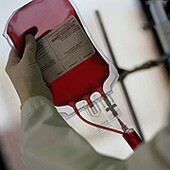- Could Your Grocery Store Meat Be Causing Recurring UTIs?
- Are You Making This Expensive Thermostat Error This Winter?
- Recognizing the Signs of Hypothyroidism
- 10 Strategies to Overcome Insomnia
- Could Artificial Sweeteners Be Aging the Brain Faster?
- Techniques for Soothing Your Nervous System
- Does the Water in Your House Smell Funny? Here’s Why
- Can a Daily Dose of Apple Cider Vinegar Actually Aid Weight Loss?
- 6 Health Beverages That Can Actually Spike Your Blood Sugar
- Treatment Options for Social Anxiety Disorder
Anemia Treatments Don’t Boost Recovery From Brain Injury, Study Finds


People who suffer a severe head injury often develop anemia, but aggressively treating the blood condition may do more harm than good, a new clinical trial suggests.
Experts said the findings, reported July 2 in the Journal of the American Medical Association, were disappointing: Treating anemia with blood transfusions — and in some cases, the medication erythropoietin — did nothing to improve brain-injured patients’ long-term recovery.
And when transfusions were used more aggressively, the risk of blood clots increased.
Lead researcher Dr. Claudia Robertson said the results “will probably change clinical practice.”
Anemia is a condition in which the body has too few oxygen-carrying red blood cells. It’s common for people with serious traumatic injuries to develop anemia, because of internal and external bleeding and other damage to the body.
In trauma victims without a brain injury, doctors normally give a transfusion of red blood cells after the patient’s hemoglobin levels fall below 7 grams per deciliter (g/dL), explained Robertson, a neurosurgeon at Baylor College of Medicine in Houston.
But, she said, there has been “controversy” over what’s best for brain-injured patients.
Hemoglobin is the oxygen-carrying protein in red blood cells, and a healthy person typically has a level of about 15 g/dL, Robertson noted. Doctors have worried that in patients with serious brain injuries, allowing hemoglobin to drop to 7 g/dL or lower could be harmful — so they often aim for higher levels.
“Red blood cells carry oxygen to the brain,” Robertson said. “So the thinking is, more oxygen is better.”
To put that theory to the test, Robertson’s team followed 200 patients who landed in one of two American trauma centers with severe head injuries. Within six hours of their injury, the patients were randomly assigned to one of four treatment groups.
In two groups, patients were transfused with enough red blood cells to keep their hemoglobin level at 7 g/dL; in one of those groups, patients also received the anemia drug erythropoietin (Epogen) — also known as “epo.” Two other groups were transfused to maintain a hemoglobin level of 10 g/dL, with or without epo.
Unlike blood transfusions, epo is not a standard part of treating anemia in critically injured patients, Robertson said. This study was set up to see whether the medication might be helpful.
In the end, it wasn’t. The epo treatments did not improve patients’ long-term recovery from their brain injury, Robertson’s team found.
Nor did the higher hemoglobin levels: Six months later, 42.5 percent of patients in the 7 g/dL group were either back to their normal lives or had moderate disabilities. That compared with 33 percent in the 10 g/dL group.
What’s more, the risk of potentially fatal blood clots was greater in patients whose hemoglobin levels were kept higher.
Dr. Jaime Levine, a specialist in brain-injury rehabilitation, said that while the findings are disappointing, they’re not all that surprising. Anemia treatments, she noted, are not specifically designed to help shield brain cells from damage.
Unfortunately, there are no medications specifically designed for traumatic brain injuries, said Levine, a clinical assistant professor at NYU Langone Medical Center in New York City.
The question of whether these anemia treatments could make a difference in patients’ brain injury recovery is “valid,” according to Levine. “It’s a good question to ask, even if it didn’t work,” she said.
Study author Robertson said that as far as blood transfusions go, she thinks her team’s findings are “definitive.”
“We should manage patients with traumatic brain injury the same way we do [trauma] patients without brain injury,” she said.
But Robertson noted that other researchers are still looking at the effects of epo on patients with brain injuries.
And, she noted, the bigger picture surrounding brain injury treatment is brighter. “Outcomes from traumatic brain injury have improved a lot in the past 20 years,” Robertson said.
She credited that to changes in how trauma care is organized — more severely injured patients are getting to “level 1” trauma centers faster — and major advances in brain-imaging technology.
More information
The U.S. National Institute of Neurological Disorders and Stroke has more on traumatic brain injury.
Source: HealthDay
Copyright © 2026 HealthDay. All rights reserved.










